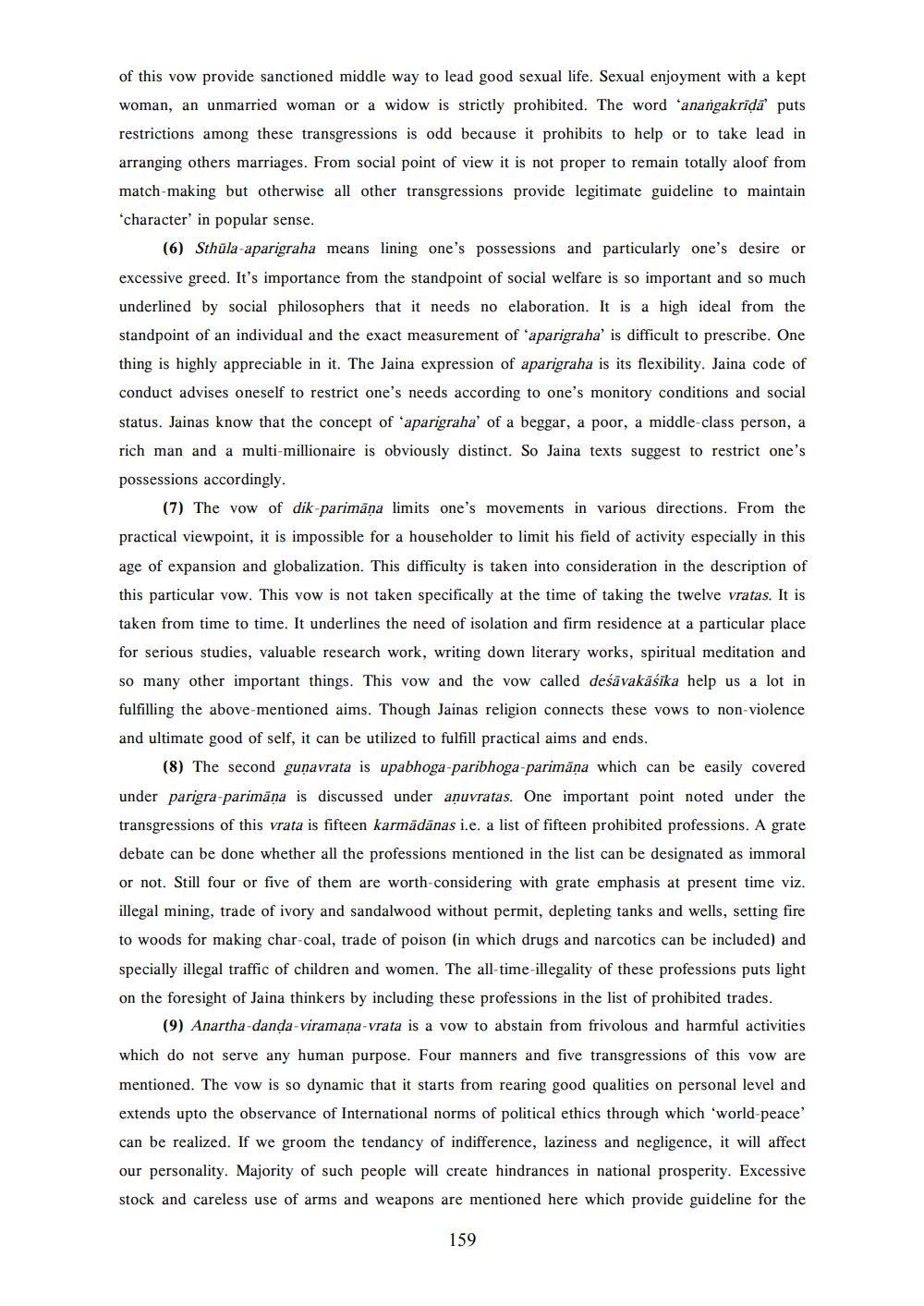________________
of this vow provide sanctioned middle way to lead good sexual life. Sexual enjoyment with a kept woman, an unmarried woman or a widow is strictly prohibited. The word 'anangakrīdā puts restrictions among these transgressions is odd because it prohibits to help or to take lead in arranging others marriages. From social point of view it is not proper to remain totally aloof from match-making but otherwise all other transgressions provide legitimate guideline to maintain *character in popular sense.
(6) Sthūla-aparigraha means lining one's possessions and particularly one's desire or excessive greed. It's importance from the standpoint of social welfare is so important and so much underlined by social philosophers that it needs no elaboration. It is a high ideal from the standpoint of an individual and the exact measurement of aparigraha' is difficult to prescribe. One thing is highly appreciable in it. The Jaina expression of aparigraha is its flexibility. Jaina code of conduct advises oneself to restrict one's needs according to one's monitory conditions and social status. Jainas know that the concept of 'aparigraha' of a beggar, a poor, a middle-class person, a rich man and a multi-millionaire is obviously distinct. So Jaina texts suggest to restrict one's possessions accordingly.
(7) The vow of dik-parimāņa limits one's movements in various directions. From the practical viewpoint, it is impossible for a householder to limit his field of activity especially in this age of expansion and globalization. This difficulty is taken into consideration in the description of this particular vow. This vow is not taken specifically at the time of taking the twelve vratas. It is taken from time to time. It underlines the need of isolation and firm residence at a particular place for serious studies, valuable research work, writing down literary works, spiritual meditation and so many other important things. This vow and the vow called deśāvakāśika help us a lot in fulfilling the above-mentioned aims. Though Jainas religion connects these vows to non-violence and ultimate good of self, it can be utilized to fulfill practical aims and ends.
(8) The second gunavrata is upabhoga-paribhoga-parimāna which can be easily covered under parigra-parimāna is discussed under anvratas. One important point noted under the transgressions of this vrata is fifteen karmādānas i.e. a list of fifteen prohibited professions. A grate debate can be done whether all the professions mentioned in the list can be designated as immoral or not. Still four or five of them are worth-considering with grate emphasis at present time viz. illegal mining, trade of ivory and sandalwood without permit, depleting tanks and wells, setting fire to woods for making char-coal, trade of poison (in which drugs and narcotics can be included) and specially illegal traffic of children and women. The all-time-illegality of these professions puts light on the foresight of Jaina thinkers by including these professions in the list of prohibited trades.
(9) Anartha-danda-viramana-vrata is a vow to abstain from frivolous and harmful activities which do not serve any human purpose. Four manners and five transgressions of this vow are mentioned. The vow is so dynamic that it starts from rearing good qualities on personal level and extends upto the observance of International norms of political ethics through which 'world-peace' can be realized. If we groom the tendancy of indifference, laziness and negligence, it will affect our personality. Majority of such people will create hindrances in national prosperity. Excessive stock and careless use of arms and weapons are mentioned here which provide guideline for the
159




